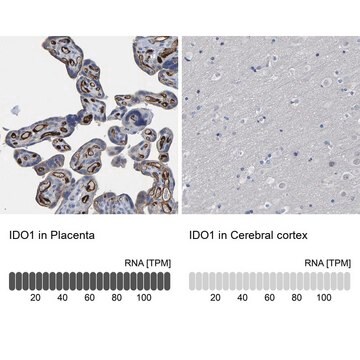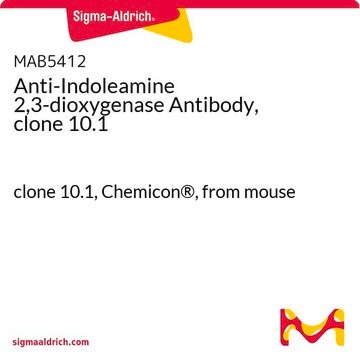MABF850
Anti-IDO-1 Antibody, clone 4B7 | MABF850
clone 4B7, from mouse
Sinónimos:
Indoleamine 2,3-dioxygenase 1, IDO-1, Indoleamine-pyrrole 2,3-dioxygenase
About This Item
Productos recomendados
biological source
mouse
Quality Level
antibody form
purified immunoglobulin
antibody product type
primary antibodies
clone
4B7, monoclonal
species reactivity
mouse, rat
technique(s)
immunohistochemistry: suitable (paraffin)
western blot: suitable
isotype
IgG1κ
NCBI accession no.
UniProt accession no.
shipped in
wet ice
target post-translational modification
unmodified
Gene Information
mouse ... Ido1(15930)
General description
Specificity
Immunogen
Application
Immunohistochemistry Analysis: A representative lot detected IDO-1 immunoreactivity in acetone-fixed frozen colon tissue sections from wild-type, but not Ido1-knockout mice (Courtesy of Dr. Sunil Thomas, Lankenau Institute for Medical Research, Wynnewood, PA).
Immunofluorescence Analysis: A representative lot detected IDO-1 immunoreactivity in acetone-fixed frozen colon and epididymis tissue sections from wild-type, but not Ido1-knockout mice by fluorescent immunohistochemistry (Courtesy of Dr. Sunil Thomas, Lankenau Institute for Medical Research, Wynnewood, PA).
Western Blotting Analysis: A representative lot detected IDO-1 in epididymis and colon tissue extracts from wild-type, but not Ido1-knockout mice (Thomas, S., et al. (2014). J. Cell. Biochem. 115(2):391-396).
Immunohistochemistry Analysis: A representative lot detected IDO-1 immunoreactivity in multiple acetone-fixed frozen tissue sections from wild-type, but not Ido1-knockout mice, including epididymis, colon, heart, liver, and 4T1-metastasized lung tissue sections (Thomas, S., et al. (2014). J. Cell. Biochem. 115(2):391-396).
Quality
Immunohistochemistry Analysis: A 1:50 dilution of this antibody detected IDO-1 in mouse kidney tissue.
Target description
Physical form
Other Notes
¿No encuentra el producto adecuado?
Pruebe nuestro Herramienta de selección de productos.
Storage Class
12 - Non Combustible Liquids
wgk_germany
WGK 1
flash_point_f
Not applicable
flash_point_c
Not applicable
Certificados de análisis (COA)
Busque Certificados de análisis (COA) introduciendo el número de lote del producto. Los números de lote se encuentran en la etiqueta del producto después de las palabras «Lot» o «Batch»
¿Ya tiene este producto?
Encuentre la documentación para los productos que ha comprado recientemente en la Biblioteca de documentos.
Nuestro equipo de científicos tiene experiencia en todas las áreas de investigación: Ciencias de la vida, Ciencia de los materiales, Síntesis química, Cromatografía, Analítica y muchas otras.
Póngase en contacto con el Servicio técnico








